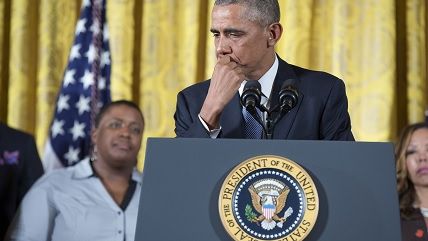A Gun-Loathing President Weeps Over the Limits to Power in a Gun-Loving Country
There are limits to the government's ability to make the country other than it is, and to force citizens to bend to official will.

Earlier this month, President Obama cried on TV while insisting, "But I really want a pony!"
Well, all right. He would have been better off wishing for a pony. He was actually hoping Americans would change their gun-loving ways—a much less attainable goal.
Obama's stage-weeping came in the course of announcing that—all by himself—he was expanding requirements for background checks to "anybody in the business of selling firearms."
What does that mean? Nobody seems to know—not even the White House, whose "fact sheet" concedes that "there is no specific threshold number of firearms purchased or sold that triggers the licensure requirement." It's all a bit loosey-goosey for the simple reason that, in the United States, the president doesn't get to change laws all by himself.
That fuzziness makes credible Attorney General Loretta Lynch's insistence that the president's executive action is perfectly constitutional. Jonathan Adler of the Case Western University School of Law sort of agrees. Obama's action "has no legal effect" he points out, since if it were "really an expansion of existing regulatory requirements, it would be legally invalid."
Presidents can stand in front of cameras, shed tears, and ask for ponies all they want. We can give them one or not, as we please, and no constitutional concerns apply.
Even The New York Times—which has editorialized for stricter gun laws on its front page—conceded in its coverage that the president's action would have "limited effect." It quoted hobbyists who occasionally sell guns saying they might be quieter about their activities, but showing little interest in otherwise changing their behavior, such as by getting licenses and running sales through government databases.
"If you are engaged in the business of selling firearms, and you know that, and you're knowingly not pursuing a license, this is not going to make you go out and get a license," Mike Sullivan, the former director of the Bureau of Alcohol, Tobacco, Firearms and Explosives, told the newspaper.
Frankly, Sullivan's comments would apply even if President Obama had convinced Congress to add legislative heft to his policy desires. How, really, is the government going to make individuals who buy and sell firearms out of public view submit to scrutiny that they resist for either pragmatic or principled reasons?
It's "very easy to get around" such restrictions on inherently private transactions, Prof. James Jacobs, Director of the Center for Research in Crime and Justice at New York University School of Law, told me last summer, even though he believes universal background checks are "probably a good idea."
Residents of New York and Connecticut collectively turned up their noses at registration requirements. Gun control measures have never drawn much in the way of compliance anywhere, no matter the threatened penalties. There is no reason to think that this time will be the exception.
So the president probably won't get that pony.
That pony morphed into something resembling a unicorn later in the president's speech. "If we can set it up so you can't unlock your phone unless you've got the right fingerprint, why can't we do the same thing for our guns?" he asked.
Because when gun owners "consider the frequency with which their $700 smart phone's fingerprint scanner fails when presented with a clean, dry, perfectly-positioned thumb, they rightly conclude that putting any type of electronic lock on their Glock will likely make them less secure, not more," Ars Technica's Jon Stokes responded in a piece published in the Los Angeles Times.
Stokes went on to detail the reliability-threatening battering electronics take in firearms, the ease with which they could be "defeated by anyone with a little time and access to YouTube," and the potential technology offers bad actors for targeting good guys' guns for hacking or theft.
"[E]lectronic locks that are likely to backfire on gun users, and that are vulnerable to exploitation by criminals, will be rejected by the market and, ultimately, by Congress," he warns.
Tellingly, while it's an early implementation of "smart gun" technology, the most widely touted existing effort—the Armatix iP1—raises reviewers' concerns with its "possibility for remote, external neutralization," multiple misfires, and delicate circuitry.
Tinkerers will certainly improve on the Armatix iP1's performance, but they're unlikely to convince Americans with access to roughly 300 million existing firearms designed to suit their taste that they should trade in the guns they already have for Frankenstein composites crafted to satisfy political requirements. A dog isn't a pony and gluing a horn to its forehead won't turn it into a unicorn.
Ultimately, President Obama's public tears are understandable—and not just in the context of the crimes he condemns. After all, cruelty has always been with us, and most people can understand the wish that the world were a nicer place filled with kinder inhabitants. It's inconceivable that an American could reach the White House and assume its powers of life and death without coming to terms with that reality.
No, the president's televised tears are understandable as tears of frustration. For all of his power, there are limits to his, and the government's, ability to make the country other than it is, and to force citizens to bend to official will.
But, if it makes him feel better, he can still have a real pony so long as he pays for it himself and agrees to clean up any messes.


Show Comments (66)